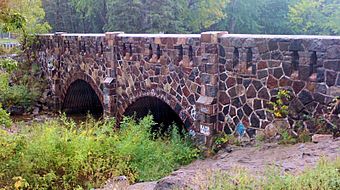Bridge 5757 facts for kids
Quick facts for kids |
|
|
Bridge No. 5757
|
|

Bridge 5757 viewed from the northwest
|
|
| Location | MN 23 over Mission Creek, Duluth, Minnesota |
|---|---|
| Area | Less than one acre |
| Built | 1937 |
| Built by | A.A. Bodin and Sons |
| Architect | Minnesota Highway Department |
| Architectural style | Multi-plate arch |
| MPS | Iron and Steel Bridges in Minnesota MPS |
| NRHP reference No. | 98000720 |
| Added to NRHP | June 26, 1998 |
Bridge 5757, also known as the Fond du Lac Culvert, is a special old bridge in Duluth, Minnesota. It was built in 1937. Its job was to carry Minnesota State Highway 23 over Mission Creek. This bridge is actually a double-span culvert, which is like a tunnel for water to flow through. It was made from strong, wavy metal plates and has walls built from granite stone. Two metal tunnels, each about 20 feet (6.1 meters) wide, let the creek pass underneath. This bridge was part of a scenic section of Highway 23 called Veterans' Evergreen Memorial Highway.
Contents
What Makes Bridge 5757 Special?
Bridge 5757 is not just any ordinary highway bridge. It has many beautiful features that make it stand out.
Unique Stone Design
The bridge's main walls, called headwalls, and its railings are covered with rough-cut granite stones. These stones come in different shades like gray, pink, and tan. The headwalls extend up to form the railings. These railings have thin, pointed openings. These openings remind people of a style called late Gothic Revival. This style was popular in old European churches and buildings.
Who Built This Historic Bridge?
Even though Bridge 5757 looks like projects from the 1930s, it wasn't built by big government programs. These programs, like the Works Progress Administration, helped people find jobs during tough times. Instead, the Minnesota Highway Department designed this bridge. A private company called A.A. Bodin and Sons built it.
It's believed that Arthur R. Nichols, a chief landscape architect, helped design it. The bridge's style is similar to the National Park Service Rustic style. This style was often used in national parks. The excellent stonework on the bridge shows the amazing craftsmanship of that time. Many projects then used a lot of skilled labor.
Why Is Bridge 5757 Historic?
Bridge No. 5757 was added to the National Register of Historic Places in 1998. This means it is considered a very important historical site. It was recognized for its local importance in engineering.
Artistic Value and Craftsmanship
The bridge was chosen because of its high artistic value. Its finely crafted stone work and Gothic Revival details are very special. It shows how engineering and art could come together to create something beautiful and useful.




